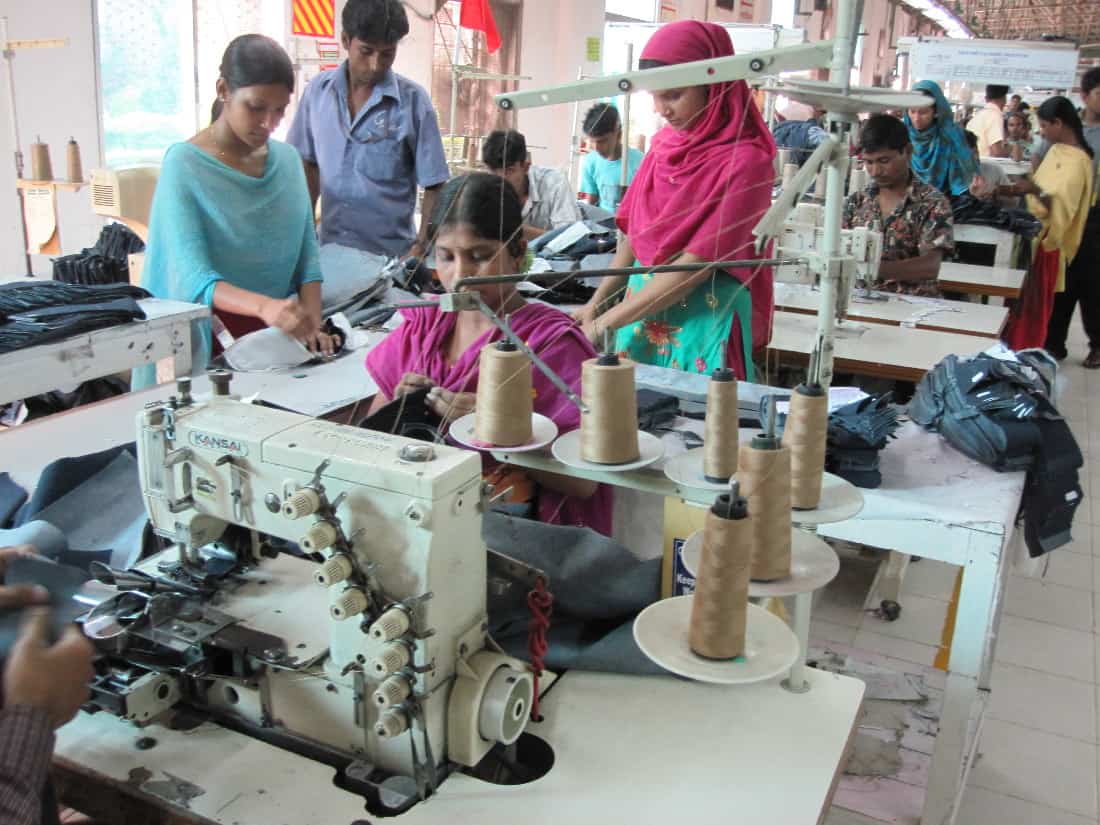
Gwendolyn Gissendanner is a student at Harvard Law School and a member of the Labor and Employment Lab.
On September 27th, California became the first state to require hourly pay—as opposed to piece-rate pay—for garment workers, thus ensuring garment workers actually earn the minimum wage. After signing the Garment Worker Protection Act (SB 62) into law, Governor Newsom called SB 62 a “nation leading” bill to combat typical, exploitative practices that overwhelmingly lower wages and worsen working conditions in a primarily Latine and Asian immigrant, woman industry. The bill includes the following components: (1) a $200 fine against garment manufacturers or contractors, payable to the employee, for each pay period the employee is paid below the minimum wage, (2) an enforceable right for employees to file a claim with the Labor Commissioner—with a rebuttable presumption of liability against the manufacturer, (3) authority to the Labor Commissioner to enforce the law with stop-order citations, (4) a requirement that all garment manufacturers and brand guarantors (retailers) keep all contracts, invoices, purchase orders, and documentation related to garment manufacturing for 4 years, (5) and finally, an extension of liability to retailers, regardless of their contracting and subcontracting structures.
This bill serves as a major win for more than 45,000 garment workers in Los Angeles, the country’s clothing assembly capital, who average 60 hour work weeks at $5 an hour—substantially below the state’s $14 minimum wage. Prior to its passage, clothing retailers created piece-rate, or price per garment, pay structures to systemically undervalue labor under the guise of “increasing worker productivity.” In reality, the industry depends on and incentivizes keeping prices as low as possible to pander to fast fashion. On average, retailers only pay manufacturers 73% of the price needed to support a minimum wage, and the manufacturers pass on the cost to employees through reduced pay and poor working conditions. Abysmal wages, along with blatant Covid safety violations throughout the pandemic, exacerbated the severity of these working conditions for this vulnerable group, catalyzing the efforts of numerous workers and advocates to organize for the bill’s passage.
The bill’s extension of liability throughout the supply chain seeks to address this harm by forbidding brands from circumventing liability for wage-theft violations. Numerous retailers outwardly support living wages for garment workers, and often send detailed codes of conduct to manufacturers, but their expectations and demands often contradict their stated goals. Retailers strategically avoid monitoring compliance codes, continuously work with bad actor manufacturers, and dictate wage structures that inevitably result in wage theft—to their direct benefit. Retailers have also been able to frustrate accountability for their violations by creating layers of subcontracting to avoid qualification, and subsequent regulation, as “garment manufacturers.” SB 62 puts an end to this lack of accountability by creating upstream liability for “brand guarantors”—or the retailers and companies contracting for the performance of garment manufacturing—by making them joint and severally liable with manufacturers, contractors, and subcontractors for unpaid minimum wages, regular wages, and overtime to employees.
While SB 62 addresses the immediate needs of garment workers, current conditions and pay rates in the industry are merely a symptom of centuries-old cycles of exploitation weaponized against immigrant laborers. Immigrant workers perform the lowest-paying, most onerous jobs with the highest rates of wage theft and fewest protections, and many immigrant workers avoid reporting their employers for fear of illegal, but common retaliation based on immigration status. While the Fair Labor Standards Act guarantees the right to overtime pay and the minimum hourly wage to all statutory employees, immigrant workers, regardless of their citizenship status, are most likely to face employer intimidation when asserting their rights. For this reason, industries with higher percentages of foreign-born workers have the highest rates of wage theft. Even for the rare few who seek to assert their rights in court, they often settle for much less than they are owed or face financial distress waiting out years-long claim processes. These dynamics create a particularly exploitative environment for the garment industry which consists of 42% foreign-born workers—a significant overrepresentation of the immigrant working population which hovers around 16% country-wide. This small victory, in an industry dominated by marginalized populations, addresses more than a century of harm in the industry.
The success of SB 62 specifically, can be attributed to a two-year battle led by garment workers and the LA-Based Garment Worker Center. This fight extends far beyond this period, however, to include more than two decades of advocacy. In 1999, manufacturer wage theft was so rampant, the California Legislature created the Garment Restitution Fund for unpaid workers. The fund is financed by $75 per employee diverted from garment manufacturers’ annual registration fees and reimbursements from violating manufacturers. It is not unusual, however, for factories to ignore complaints, refuse reimbursement demands, declare bankruptcy, and abruptly shut down without impunity—decimating the fund. In addition, numerous UCLA Labor Center reports, dating back to 2010, warned of the crisis of wage theft and estimated immigrant workers in LA county lost an average of $2000 at the hands of employers per year, equating to $26 million in wage theft per week. Also during that time, the Obama Administration’s Department of Labor, found violations in 85% of Los Angeles’ garment factories. SB 62 functions as a culmination of decades of investigation, advocacy, and calls to address egregious behavior throughout the garment industry, and importantly, recognizes the limits of placing liability solely on manufacturers whose violations stem directly from exploitative contracts with retailers.
Its passage did not come without opposition, however. The California Chamber of Commerce called the bill a “job killer” and warned of an exodus of fashion companies to cheaper manufacturers abroad. As it stands, clothing “Made in America” only accounts for 3% of apparel sold in the U.S., meaning passage of this bill can threaten an already small market-share. Rick Helfenbein, a retired chairman of the American Apparel and Football Association, also argued raising garment workers’ wages would put California’s 46,000 “entry level garment jobs at risk.” Advocates refute these assertions by showing that they depend on the American fashion industry illegally underpaying garment workers and also misrepresent the range of experience between garment workers, many of whom have been in the industry for 20-plus years. Additionally, increases in demand for responsibly-sourced clothing among two-thirds of North Americans, signals an opportunity for U.S. brands and manufacturers who ethically monitor their supply chain, to increase their market share. As labor laws tighten globally to address human rights violations, the U.S. can serve as a leader for best practices within the industry, while increasing its sustainability-focused consumer base.
Regardless of any uncertainty for the fashion industry, this bill serves as an undisputed nightmare for sweatshop operators who can no longer exploit garment workers and their communities. In the long term, advocates hope this legislation will extend to other immigrant-heavy states such as New York, Texas, and Florida, and ultimately trickle-up to create federal protections, beyond fashion, for accountability in all supply chains. While many garment workers and advocates know the fight against wage theft cannot end with SB 62, its passage serves as a substantive step towards better livelihoods and better working conditions for a historically exploited group.










Daily News & Commentary
Start your day with our roundup of the latest labor developments. See all
December 11
In today’s News and Commentary, Biden’s NLRB pick heads to Senate vote, DOL settles a farmworker lawsuit, and a federal judge blocks Albertsons-Kroger merger. Democrats have moved to expedite re-confirmation proceedings for NLRB Chair Lauren McFerran, which would grant her another five years on the Board. If the Democrats succeed in finding 50 Senate votes […]
December 10
In today’s News and Commentary, advocacy groups lay out demands for Lori Chavez-DeRemer at DOL, a German union leader calls for ending the country’s debt brake, Teamsters give Amazon a deadline to agree to bargaining dates, and graduates of coding bootcamps face a labor market reshaped by the rise of AI. Worker advocacy groups have […]
December 9
Teamsters file charges against Costco; a sanitation contractor is fined child labor law violations, and workers give VW an ultimatum ahead of the latest negotiation attempts
December 8
Massachusetts rideshare drivers prepare to unionize; Starbucks and Nestlé supply chains use child labor, report says.
December 6
In today’s news and commentary, DOL attempts to abolish subminimum wage for workers with disabilities, AFGE reaches remote work agreement with SSA, and George Washington University resident doctors vote to strike. This week, the Department of Labor proposed a rule to abolish the Fair Labor Standards Act’s Section 14(c) program, which allows employers to pay […]
December 4
South Korea’s largest labor union began a general strike calling for the President’s removal, a Wisconsin judge reinstated bargaining rights for the state’s public sector workers, and the NLRB issued another ruling against Starbucks for anti-union practices.